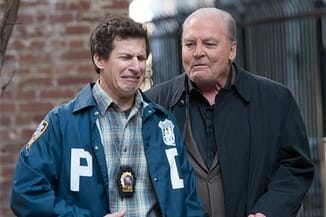
Brooklyn Nine-Nine understands its genre. This is not the same as employing the formula or parodying iconic moments of a genre’s greatest movies and TV shows—both of which Brooklyn Nine-Nine does well, nevertheless—but having an appreciation for what makes that story type function and how it is constructed. “Old School” is the finest example of how this series turns its fluency with cop stories into brilliantly witty and satisfying comedy.
In this episode, Peralta and Santiago are the subjects of an article about the 21st century detective written by a fictional author named Jimmy Brogan (played by Stacy Keach) whose equally fictional 1970s, embedded-with-cops book, The Squad, inspired Jake to join the force. Keach’s Brogan is, as the title would suggest, more old-school than Richie Aprile, and he embodies all the classic hard-boiled tropes of cop drama lore: he drinks like a fish with dysentery, he meets Jake in a shvitz (a shvitz!), and he thinks anyone who sits at a desk all day—a “hairbag,” he calls them—is not doing real police work. Unfortunately for Peralta, his disproportionate idolization of Brogan leads him to drink an entire bottle of whiskey and trashing his commanding officer while on the record.
The events that follow, wherein Jake attempts to persuade Jimmy to pull his quotes because he was intoxicated, underscore the series’ genre understanding perfectly. In confronting Jimmy, Jake (and the audience) is led to believe that the only way to keep the quotes from going to press will be by punching the septuagenarian. By the old school standard, Jimmy was demanding Jake to fight him, but when Jake punched him it appeared that Jimmy was genuinely surprised by the assault. This is a zig that many sitcoms would make, and a very fine zig at that: Jake misunderstands the situation, zealously punches Jimmy who then publishes a scathing article that hurts the department, Jake and Holt. This is what happens as Holt practically gives Peralta the your-gun-and-your-badge punishment and shows his potent temper for the first time in the show’s early run. It is not until later, when Santiago explains the whole story to Holt, that the story zags. (Even this took some hilarious series self-awareness and coercion from Holt: “I know you’re manipulating me, but I love it and will tell you anything,” Santiago says.)
Santiago explains that Peralta managed to get the quotes pulled without conflict, and only punched Brogan after he unabashedly referred to Holt twice with the same homophobic slur. All at once, Brooklyn Nine-Nine shows the ways in which the classic cop drama’s hypermasculine milieu is flawed and far from admirable while also giving purpose to Holt’s homosexuality. What had seemed before to be of minor significance among the precinct’s young staff was suddenly given context by the introduction of this dinosaur. It is impressive not only that “Old School” was able to critique the genre but also employ its structures and stereotypes to play with the audience’s and characters’ emotions. There was legitimate concern that Peralta had finally screwed himself in an irrevocable way and that his unflagging idiocy was incurable.
All of this was wrapped inside an episode that included great hangover humor (“Ughhh, my whole body has drymouth”), advancement of the Rosa-Charles dynamic, which could warrant another recap by itself, tiny nuggets of inside-joke goodness and a not-unsubtle Die Hard reference (again highlighting the writers’ supreme understanding of the genre). It was Brooklyn Nine-Nine’s best episode yet and the one that elevates it from an enjoyable new fall sitcom to must-watch TV (as much as any network television show can invoke such an imperative).
GET PASTE RIGHT IN YOUR INBOX
The best music, movies, TV, books, comedy and more.